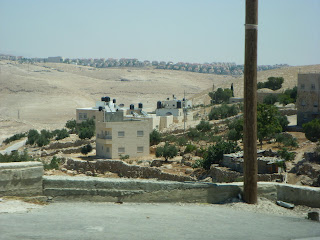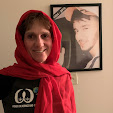
Dear Friends,
I returned to Hares after taking 2 days to go to Deir Ibzi'a and Jerusalem to pick up and mail embroidery home and also to see Arla off to the airport. That meant that I missed going to one of the Friday demonstrations against the wall. (I usually go to the one in Bil'in and I was especially sorry that I missed this one because Naomi Klein was there!) I just read the reports about them and they seemed to unfold as usual, fortunately with no serious casualties.
So the demonstrations continue week after week. As does wall construction, land confiscation, settlement building, settler/army violence. Every week the Palestinian Center for Human Rights (PCHR) issues a report and from week to week they are depressingly similar. (Here is a link to the one for this week which actually is relatively tame:
http://www.pchrgaza.org/files/W_report/English/2008/25-06-2009.htm )
The occupation has become normalized. Horrible, intolerable circumstances have become the substance of daily life in Palestine.
Last Tuesday Israel's internal security minister, Yitzhak Aharonivitch, a member of an extremest right-wing party, made an unannounced visit to the Temple Mount (3rd most holy place in Islam), supposedly to assess the adequacy of police deployment in the area. He was accompanied by Israel's police commissioner and senior police officers. His spokesman told Reuters that the visit was coordinated with the Muslim Waqf, however, the Waqf foundation called the visit a "provocative entry to the holy site, which may complicate the sensitive situation."
You may recall that it was a visit to the Temple Mount nine years ago by Ariel Sharon that sparked the second Intifada. This time, the provocative visit was tolerated with nary a response. Did the story even reach U.S. media?
The checkpoints have also become normal despite the fact that they choke the economy, restrict education and access to medical care (even in emergency situations) and basically keep Palestinians in an open air prison. On my way to Jerusalem with Arla, we had to go through Qalandia, the major checkpoint between Ramallah and Jerusalem. It is a huge and high-tech processing station where Palestinians are required to proceed through incredibly narrow cage-like aisles to incredibly tiny cage-like turnstiles that are completely controlled by soldiers who are virtually hidden behind steel and bullet-proof glass. Often, with a push of a button and a sickening click, the turnstile will lock with someone inside. The soldiers bark orders through an intercom that is turned up to a decibel level that I'm sure would violate OSHA standards. Furthermore, the soldiers routinely belittle and humiliate Palestinians as they pass through. (Of course it is only the Palestinians with Jerusalem IDs that even have the privilege of passing through this particular checkpoint.) As Arla and I followed the Palestinians off the bus to go through this disgusting labyrinth I marveled at the acceptance and matter of fact attitudes around me. Surely this is insane. But, no, I told myself. This is just their ordinary daily life.
This link is a video of it, not the best video, but it gives a small sense of this monstrosity.
http://www.youtube.com/watch?v=ahNVMQ_XdGE
For me, the most heinous normalcy is the routine arrest, detainment, imprisonment and torture of virtually the entire male population of Palestine at some point in their lives, sometimes even as children. Just a few weeks before I arrived in Hares the army came through and rounded up 150 boys, blindfolded and handcuffed them so tightly their hands turned blue and beat many of them. The story can be found at this link:
http://groups.google.com/group/uk.religion.islam/browse_thread/thread/26a29e1f4050a880?pli=1
And no Palestinian man is immune to this. A young award-winning Palestinian journalist who was even under diplomatic escort was beaten and tortured upon his return home to Gaza after having accepted a prestigious award in London.
http://www.agenceglobal.com/Article.asp?Id=2042
http://desertpeace.wordpress.com/2008/07/17/mohammed-omer-the-truth-and-nothing-but /
The picture at the top of this posting was taken yesterday. Beth and I were traveling on a bus to Ramallah to hear Naomi Klein. We saw 3 jeeps and soldiers ahead blocking the road. We assumed it was a flying checkpoint, but to our surprise the bus just veered around it. I randomly stuck my camera up in the air towards the window on the other side of the bus and snapped a picture, figuring I might get a good picture of a flying checkpoint. But when I looked at the picture, I saw that this wasn't a flying check point at all. There was a young man, blindfolded and handcuffed being detained. Although Beth and I were immediately alarmed, everyone else on the bus seemed to just grimly go on with their ride.
Love,
Wendy











